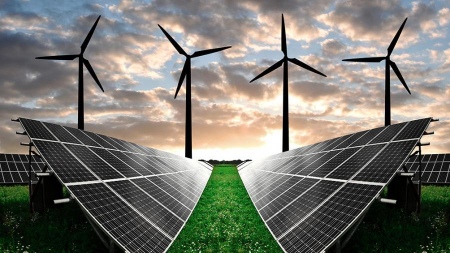One year after the start of the war between Russia and Ukraine, one of the unexpected consequences of the war was the increase of more than 20% in the use of wind and solar energy in the European Union (EU), which replaced almost 75 % of Russian fossil gas imports, while the world is poised to add as much renewable energy in the next five years as it has in the last 20, according to new analysis from Zero Carbon Analytics.
In its analysis “Energy markets, one year after the invasion of Ukraine”, this international research group explained that the restriction of the shipment of gas from Russia to the EU meant the substitution of almost 75% of the imports of this fuel in that territory, while global gas demand stagnated for the first time and is forecast to peak by the end of the decade.
“Before its invasion of Ukraine, Russia was by far the world’s largest exporter of oil and natural gas to world markets. Since then, its position has declined dramatically. Pipeline flows from Russia to Europe have plummeted by 80 % in just one year,” said Fatih Birol, Executive Director of the International Energy Agency (IEA), and argued that “cleaner alternatives to fossil fuels are growing rapidly as governments seek to strengthen their energy security.”

The The sum of wind and solar energy reached 22% of energy generation in the European Union in 2022which represents a record figure that surpasses for the first time the energies produced with fossil fuels, which stood at 20% of the total, according to the “European Electricity Review” study.
From Zero Carbon Analytics, they assured that the world is ready to add as much renewable energy in the next five years as in the last 20.
“Globally added renewable energy capacity increased by around a quarter in 2022. Global electric car sales are up close to 60%, investments in energy efficiency are up, as are heat pump installations. And now , nuclear power is making a comeback,” Birol said.
“My hope and expectation is that they don’t stop now. Instead, they need to keep going to further accelerate clean energy transitions,” the expert opined.
The fall in demand for gas
In the EU fell 10% in the first nine months of 2022 and it is expected to fall by 43% by 2030 if the EU meets its long-term climate commitments.
In the Zero Carbon Analytics study, gas demand was predicted to peak by the end of the decade.
Meanwhile, the High gas and coal prices accounted for 90% of the increase in electricity costs worldwide in 2022.
“Russia’s callous invasion of Ukraine has rewritten the history of Europe. Its foundations are the courage of Ukrainians and the need for a new geopolitics of renewable energy: where gas must not be weaponized and autocrats must not be supported with money whose source is blood,” said Laurence Tubiana, CEO of the European Climate Foundation.
For Marcelo Álvarez, president of the solar committee of the Renewable Energy Chamber (Cader) of Argentinathis development of renewable energies as a consequence of the war in Russia and Ukraine “had a stronger impact in Europe but had its rebound in Latin America”.
“You can see the glass half full or half empty. The installed capacity of renewable energy in our energy matrix increased fivefold: it went from 2% in 2015 to 14% today. It is a sustained and rapid growth but that It is far from what Law 27,191 establishes, since we should have been at 16% last year to reach the goal of 20% of the electricity matrix by 2025,” he explained to Télam.
Of the renewable energy that is produced in the country, 75% is wind, 20% solar and 5% biomassaccording to data from Cader.
Álvarez highlighted that it is possible to develop the energy transition thanks to the fact that Argentina has significant industrial, scientific and technological development, but certain structural problems still remain in these projects.
“We have a lack of infrastructure to transport that energy to the consumption centers, where 40% is in Buenos Aires. There has been a lack of investment in the last 15 years and we need to recover transport capacity to be able to build new and large wind farms or solar,” he said.
Meanwhile, Álvarez clarified that the international financing problems that Argentina has threaten this transformation.
“Renewables are cheaper than fossil fuels, but with these financing problems, investment is made in fossil fuels, which are easier. The challenge that renewables have is to create a system that manages more cheaply, the main challenge is not technological but administrative “, he concluded.

















